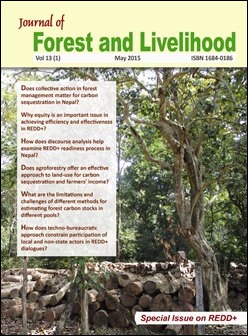Nepal’s REDD+ Readiness Preparation and Multi-Stakeholder Consultation Challenges
DOI:
https://doi.org/10.3126/jfl.v13i1.15364Keywords:
REDD , Multi-stakeholder, Policy process, Consultation, InstitutionsAbstract
Nepal is currently undergoing a Reducing Emission from Deforestation and Forest Degradation, sustainable management of forest, and conservation and enhancement of carbon (REDD+) readiness process. The Government of Nepal has announced a high level political commitment, willingness and preparedness to attract diverse interests in policy deliberation for its REDD+ process. This paper examines Nepal’s REDD+ policy deliberation process from a political ecology perspective, focusing on expressions of discursive power and representation within Nepal’s ongoing multi-stakeholder REDD+ preparation. The analysis is based on interviews, policy document reviews and observations of public consultations to solicit comments for REDD+ strategy during the year 2013-2014. The analysis found that Nepal’s institutional REDD+ planning structure is highly dominated by techno-bureaucratic top-down practices representing government interests and international donors’ requirements, while sub-national and non-governmental stakeholders often find themselves to be merely used to legitimize the policy process rather than to actively shape it. A considerable share of policy preparations is left to the outsourced experts, and the multi-stakeholder consultation meetings have proven to be ineffective to bring the weak actors’ perspectives that actually participate in those meetings. Both the ‘geographical space’ and ‘political space’ offered in the consultations are not favourable for the local actors, but are controlled by the dominant actors. Overall, our analysis highlights important challenges and an urgent need to improve design and practice of the consultation process in order to ensure a sound multi-stakeholder process so as to meet the demands of the local forest realities as well as those of the international REDD+ requirements.
Journal of Forest and Livelihood 13 (1) May, 2015, Page :30-43
Downloads
Downloads
Published
How to Cite
Issue
Section
License
CC-BY-NC: This license allows reusers to distribute, remix, adapt, and build upon the material in any medium or format for noncommercial purposes only, and only so long as attribution is given to the creator.





